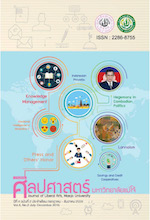ผลของการฝึกความไวในการรับความรู้สึกต่อความฉลาดทางอารมณ์ของนิสิตเจเนอเรชั่นวาย สาขาจิตวิทยา มหาวิทยาลัยนเรศวร (The Effects of Sensitivity Training on Emotional Intelligence of Generation Y Students Psychology Major Naresuan University)
Main Article Content
Abstract
ผลการวิจัยพบว่า ระดับความฉลาดทางอารมณ์ ภายหลังจากการฝึกความไวในการรับความรู้สึกสูงกว่าก่อนการเข้ารับการฝึกอย่างมีนัยสำคัญทางสถิติที่ .001 เมื่อวิเคราะห์ความฉลาดทางอารมณ์เป็นรายด้าน พบว่า ด้านแรงจูงใจ ด้านการตัดสินใจและแก้ไขปัญหา และด้านภูมิใจตนเอง ภายหลังจากการฝึกความไวในการรับความรู้สึกสูงกว่าก่อนเข้ารับการฝึกอย่างมีนัยสำคัญที่ระดับ.001 ส่วนด้านการควบคุมตนเอง ด้านการเห็นใจผู้อื่น และด้านพอใจในชีวิต มีระดับนัยสำคัญที่ .01 สำหรับด้านความรับผิดชอบและด้านสัมพันธภาพ มีระดับนัยสำคัญที่ .05 แต่ความฉลาดทางอารมณ์ด้านความสุขสงบทางใจก่อนและหลังการเข้ารับการฝึกความไวในการรับความรู้สึกไม่แตกต่างกันอย่างมีนัยสำคัญทางสถิติที่ .05
The objectives of this quasi-experimental research,one group pretest- posttest design, were to study the effects of sensitivity training on emotional intelligence of generation Y students, Psychology Major, Naresuan University. The samples of this study were 36 third-year students majoring in Psychology, Faculty of Social Science, Naresuan University. They were selected by purposive sampling. The criteria in selection were that they should be 20 years old students who had never been accessed in any sensitivity training beforehand. The research instruments were Emotional Intelligence Screening Test for 18-60 years old adult from the Department of Mental Health, Ministry of Public Health, and sensitivity training exercise developed by Dr. Nathawat Longthong. The data were analyzed by the descriptive statistics and Wilcoxon Singed Ranks Test respectively.
It was found out that the level of emotional quotient had significantly increased after sensitivity training at the level of significance .001. Moreover, in the aspect of motivation, decision-making and problem solving, and self-esteem, they were also higher at the level of significance .001. In the aspect of self-control, empathy, and life satisfaction, they increased at the level of significance .01. Furthermore, their responsibility and interpersonal relationship were higher at the level of significance .05 as well. However, there was no difference in peacefulness aspect found before and after the training at the level of significance .05.

